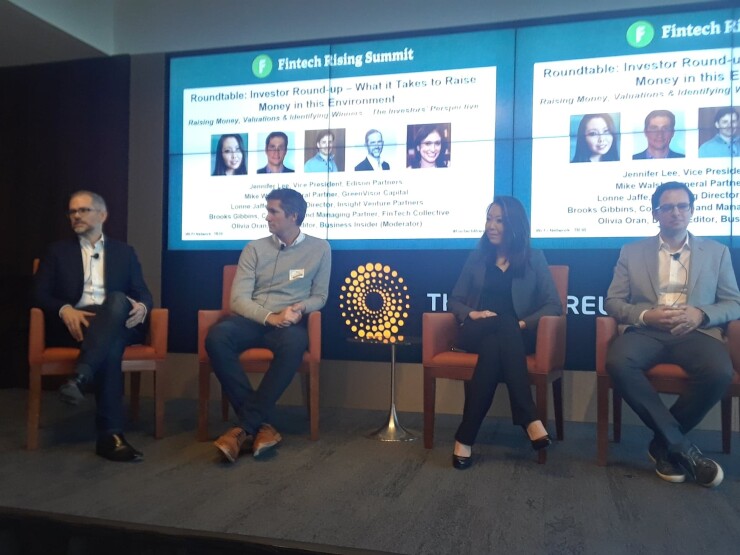Veteran fintech investors have a harsh message for banks and other traditional financial firms: Stop playing venture capitalist.
“Corporates are setting up $100 million funds and going out and playing ‘Startup Theater,' " Brooks Gibbins, co-founder and managing partner at Fintech Collective, said during an investor panel this week held at the Fintech Rising 2019 Summit in New York.
“A lot of the participants are tourists," he said. "We are in the adolescence of corporates figuring out how to engage with these companies. It’s a process of externalizing R&D.”
Other panelists said that most large institutions, eager for return on investment, end up imposing too many controls that slow down otherwise nimble young companies. A few that are more experienced with venture capital make better partners.
“Many corporates are set up as a business development or innovation arm — they’re there to waste startups' time," said Michael Walsh, general partner at Green Visor Capital in San Francisco. "And then there are other guys set up like a traditional VC arm with people who have a VC background."
Walsh said the key to success is to provide startups with support without tripping up development — which some banks are better at than others.
One startup his firm invested in was DataFox, an artificial intelligence sales company that the software giant Oracle announced it would acquire in October. Another investor was Goldman Sachs.
“They were very helpful in terms of getting customer revenue from the company and not getting too involved," Walsh said.

The panel acknowledged the draw of fintech for banks right now: There are now over 5,700 fintech startups in the Americas (and counting), and fintech funding has reached new highs, with deal activity near $12 billion in 2018, a 38% year-over-year increase.
And the startup industry hasn’t even peaked yet, the panel said, predicting that other investing avenues will open up with the adoption of quantum computing technology in financial services.
“I think we’ve got 20 to 30 years to run, and then quantum is going to show up and we can start over again,” Gibbins said.
Lonne Jaffe, managing director at Insight Venture Partners, said fintech companies are sustainable and “macroeconomically resistant.” While interest rate increases cause the cost of capital to go up, high-growth companies are less affected, he said.
“As people are thinking about their overall portfolio allocation, indexing towards high-growth businesses who are building huge amounts of economic power is not a crazy idea,” Jaffe said. “If you’re investing in a high-profit, low-growth software company that is levered up six times, that can be a little dangerous, because you don’t have to have much in the way of interest rates going up for you to lose all of your equity.”
He added that inflation is hovering at 2% in the general economy, but tech prices have declined dramatically. He noted that hard-drive prices have dropped from roughly $500,000 per gigabyte in 1982 to 3 cents per gigabyte last year.
“One of the things that’s happening is we’re creating new business models,” Jaffe said. “That can build huge economic power by reshaping the traditional financial services firm and other types of economic power around machine learning, artificial intelligence and data.”





